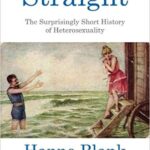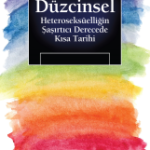Dr. Ellie R. Schainker has received major external support for her current research. The Fulbright Program will support Schainker’s fieldwork in Lithuania and Israel over the next two summers through a Global Scholar Award. In addition, the Jewish Museum & Tolerance Center in Moscow awarded Schainker a fellowship for research in the summer of 2019. Schainker is the Arthur Blank Family Foundation Associate Professor of Modern European Jewish History.
Month / March 2019
Turkish Translation of Hanne Blank’s ‘Straight: The Surprisingly Short History of Heterosexuality’ Released
PhD Candidate Hanne Blank recently published a Turkish translation of her 2012 book Straight: The Surprisingly Short History of Heterosexuality (Beacon Press). Merve Özturk translated the work, whose Turkish title is Düzcinsel: Heteroseksüelliğin Şaşırtıcı Derecede Kısa Tarihi, for Istambul-based publisher İletişim Yayınları. A graduate fellow in the Emory History Department, Blank is also a visiting professor in Women’s and Gender Studies at Denison University.
Astrid M. Eckert Co-Edits Special Journal Issue of ‘Central European History’
Dr. Astrid M. Eckert, Interim Director of Undergraduate Studies and Associate Professor of History, recently co-edited a special issue of the journal Central European History. The March 2019 edition is entitled “New Narratives for the History of the Federal Republic.” Eckert co-authored the introduction, “Why Do We Need New Narratives for the History of the Federal Republic?,” with Frank Biess of UC San Diego. Read their introduction along with the other articles here.
History Honors Student and Undergraduate Fox Center Fellow Yi Xie (19C) Reflects on Research
Senior History Honors student Yi Xie is currently working on her thesis as an undergraduate fellow at the Fox Center for Humanistic Inquiry. Xie’s thesis is titled “Becoming American in a Multiracial Context: Chinese ‘Sojourners’ and African Americans’ Battle for Inclusion in a White Republic, 1868-1904.” She recently wrote a reflection, “Becoming American: A Historical Parallel between Chinese Immigrants and African Americans, 1868-1904,” about her research and experiences at the Fox Center. Read the full post here along with an excerpt from the abstract of her project below.
“This research aims to develop a clear understanding of the racial dynamics of the second half of the nineteenth century by studying the ‘Chinese Question,’ the ‘Negro Problem,’ and the relations between the two from the perspectives of abolitionists, Caucasian immigrants, African Americans, and the Chinese. She investigates why and how the ‘Chinese Question’ and the ‘Negro Problem’ were conflated and differentiated, and how dynamic and complex were the relations between the two. She also conducts a comparative study of anti-black and anti-Chinese violence on the West Coast. She has visited archives in Northampton, MA and will conduct more archival research in Seattle, WA.”
Dr. Carol Anderson on Election Fraud and Voter Suppression in ‘The New York Times’
Dr. Carol Anderson recently published an opinion piece, “Our Democracy Is Being Stolen. Guess Who the Thieves Are,” in The New York Times. Anderson is Associated Faculty in the History Department and Charles Howard Candler Professor and Chair of African American Studies. Her piece addresses claims and realities of voter suppression and election fraud with a focus on the recent midterm election in North Carolina’s Ninth Congressional District. Anderson is, most recently, the author of White Rage: The Unspoken Truth of Our Nation’s Divide (Bloomsbury, 2017). Read an excerpt below along with the full piece here.
“The real theft of American democracy happens through election fraud and voter suppression. And Republicans are the thieves.
“What happened in North Carolina during the 2018 midterms was a textbook case of election fraud. That’s when a candidate’s campaign sets out to manipulate vote tallies to steal an election.”
Mary L. Dudziak in ‘The Washington Post’: “The Toxic Legacy of the Korean War”
Asa Griggs Candler Professor of Law Mary L. Dudziak recently published an article in The Washington Post on how the Korean War shaped the balance of power between the executive and legislative branches of the United States government. Dudziak, who is affiliated faculty in the History Department, charts how Harry S. Truman’s 1950 decision to authorize military action in the Korean peninsula without congressional authorization established a precedent that U.S. presidents have invoked since. Read an excerpt of Dudziak’s piece below and the full article, “The toxic legacy of the Korean War,” here:
“The Korean War precedent converged with and informed another practice. After Korea, authorizations for the use of military force became the primary way for Congress to exercise its constitutional power. This method has been around since 1798, when President John Adams sought authority to use the Navy to protect American ships during an undeclared naval war with France.
Authorizations replaced war declarations for even large-scale wars like the one in Vietnam. In 2001, Congress passed an Authorization for Use of Military Force approving armed conflict “against those nations, organizations, or persons” who had “planned, authorized, committed, or aided the terrorist attacks that occurred on September 11, 2001,” and those who had harbored them. Like the Korean War precedent, this had unexpected aftereffects. It was later interpreted to apply to groups that did not even exist at the time it was passed. Through this process, presidential war power has become a one-way ratchet. By failing to step in, Congress has acquiesced in the loss of its own power.”
‘HowStuffWorks’ Features Crespino’s ‘History 385: Right-Wing America’
This spring Jimmy Carter Professor of History and Department Chair Joseph Crespino is teaching a 385 course titled “Right-Wing America.” HowStuffWorks contributing writer John Donovan recently featured Crespino’s course in the article “Bridging the Chasm: Emory Class Delves Into America’s Right-wing History.” HowStuffWorks editorial board describes the website as a “source for unbiased, reliable, easy-to-understand answers and explanations of how the world actually works.” Read the full article here and check out Donovan’s observations from the first day of the spring course below.
“‘Donald Trump really defied what we thought we knew about American politics,’ Crespino tells his class that first day. ‘Trump’s election not only kind of upended what we thought were these iron laws of American politics’ — mainly, that candidates have to run toward the center to get elected — ‘but it also makes the American past look a lot different, you know? Things that we used to take for granted as kind of hiccups along the way all of a sudden look more important. And they look more ominous. And we begin to see that they weren’t just hiccups, but they’re kind of a recurring pattern.’
That pattern is what interests scholars. It’s what Crespino hopes his students will grasp, too; that the ideas and beliefs that drive right-wing America today didn’t begin with Trump. And they won’t disappear when he does, either.”

